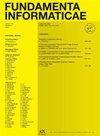代数规则的卵石游戏
IF 0.4
4区 计算机科学
Q4 COMPUTER SCIENCE, SOFTWARE ENGINEERING
引用次数: 25
摘要
我们定义了一个划分对策的一般框架,用以表述有限结构上的二人卵石对策。我们证明了一种特殊的这样的对策,我们称之为可逆映射对策,产生了一组多项式时间近似的图同构,它严格强于著名的Weisfeiler-Lehman方法。我们引入的一般框架包括有计数和无计数有限变量逻辑的卵石博弈作为特例。它还包括一个矩阵等价对策,这里介绍了矩阵秩逻辑的有限变量片段的等价性。我们证明了可逆映射博弈定义的等价是这三个博弈定义的等价的细化。本文章由计算机程序翻译,如有差异,请以英文原文为准。
Pebble Games with Algebraic Rules
We define a general framework of partition games for formulating two-player pebble games over finite structures. We show that one particular such game, which we call the invertible-map game, yields a family of polynomial-time approximations of graph isomorphism that is strictly stronger than the well-known Weisfeiler-Lehman method. The general framework we introduce includes as special cases the pebble games for finite-variable logics with and without counting. It also includes a matrix-equivalence game, introduced here, which characterises equivalence in the finite-variable fragments of matrix-rank logic. We show that the equivalence defined by the invertible-map game is a refinement of the equivalence defined by each of these three other games.
求助全文
通过发布文献求助,成功后即可免费获取论文全文。
去求助
来源期刊

Fundamenta Informaticae
工程技术-计算机:软件工程
CiteScore
2.00
自引率
0.00%
发文量
61
审稿时长
9.8 months
期刊介绍:
Fundamenta Informaticae is an international journal publishing original research results in all areas of theoretical computer science. Papers are encouraged contributing:
solutions by mathematical methods of problems emerging in computer science
solutions of mathematical problems inspired by computer science.
Topics of interest include (but are not restricted to):
theory of computing,
complexity theory,
algorithms and data structures,
computational aspects of combinatorics and graph theory,
programming language theory,
theoretical aspects of programming languages,
computer-aided verification,
computer science logic,
database theory,
logic programming,
automated deduction,
formal languages and automata theory,
concurrency and distributed computing,
cryptography and security,
theoretical issues in artificial intelligence,
machine learning,
pattern recognition,
algorithmic game theory,
bioinformatics and computational biology,
quantum computing,
probabilistic methods,
algebraic and categorical methods.
 求助内容:
求助内容: 应助结果提醒方式:
应助结果提醒方式:


